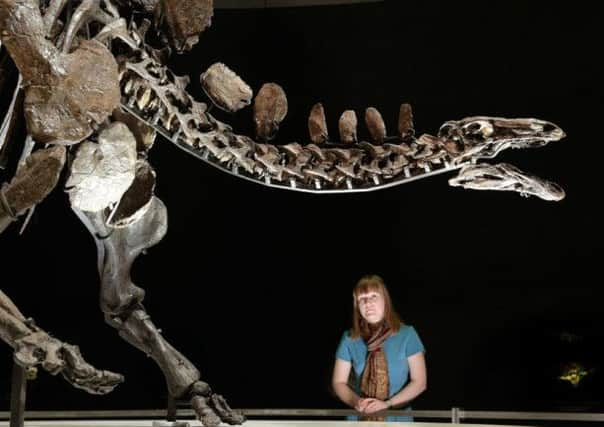Big bang theory: Volcano eruptions didn’t kill off dinosaurs, say experts


The most popular theory since the 1980s has been that they died after an asteroid strike, but in recent years some scientists have speculated that volcanic eruptions in the Deccan Traps in India may have caused the mass extinction of dinosaurs.
But now a new study from scientists at the University of Leeds has poured cold lava on that theory, and says that the effect of volcanoes on dinosaurs has been over-estimated.
Advertisement
Hide AdAdvertisement
Hide AdThe findings suggest that long-lasting volcanic eruptions called continental flood basalts would probably not have altered global climate enough to trigger a mass extinction.
Dr Anja Schmidt, from the University of Leeds, who led the new research, said: “At the time when the dinosaurs reigned, numerous long-lasting eruptions took place over the course of about a million years. These ‘continental flood basalts’ were not like volcanic eruptions we often see today, with lava gushing from the ground like a curtain of fire.
“Each eruption is likely to have lasted years, even decades, and eruptions were separated by periods without volcanic activity. The lava produced by an eruption of average intensity would have filled 150 Olympic-size swimming pools per minute.”
One common theory was that gases and sulphur from the eruptions filled the atmosphere, stopping sunlight from reaching Earth and dramatically cooling temperatures.
Advertisement
Hide AdAdvertisement
Hide AdBut the study, published online yesterday in Nature Geoscience, states that the cooling effect was not as drastic as originally thought.
Dr Schmidt said: “Scientists have tried to estimate how the temperature of the earth’s surface would have changed. It was less cooling than originally thought - and actually, the majority of animals would probably have coped.”
The team of researchers, from across Europe and the United States, found that the flood basalts would have had to flow for hundreds of years continuously to have had a severe climatic impact on plants and animals.
They used a sophisticated computer simulation of the spread of the gas and aerosol particles to show that the climatic impacts of flood basalts was less grim than scientists had previously suggested.
Advertisement
Hide AdAdvertisement
Hide AdDr Schmidt said: “Perhaps most intriguingly, we found that the effects of acid rain on vegetation were rather selective. Vegetation in some but not all parts of the world would have died off, whereas in other areas the effects would have been negligible.”
A University of Leeds spokesman said: “The new findings will challenge the earth sciences community as a whole to re-examine the causes of mass extinctions and the role of volcanism.”
But Dr Schmidt said that there is still a chance volcanoes had an impact on the destruction of dinosaurs - in line with other research completed over the past few years which suggests that the extinction was caused by a ‘double effect’ of an asteroid strike coupled with volcano storms. She said: “There is really, really good evidence that both volcanic eruptions and an asteroid strike impacted at the same time.
“We need to work out how long the eruption periods lasted - it could have been one year, ten years or a thousand years. So far we don’t understand how much damage the asteroid would have done.”